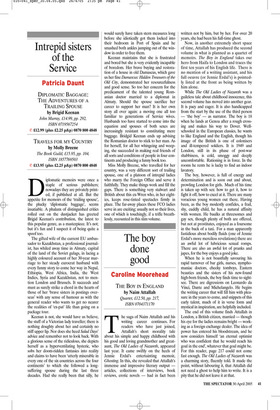The boy done good
Caroline Moorehead
THE BOY IN ENGLAND by Naim Attallah Quartet, £12.50, pp. 217, ISBN 0704371170 The saga of Naim Attallah and his writing career continues. For readers who have just joined, Attallah’s short morality tale about his simple and happy childhood with his good and loving grandmother and greataunt, The Old Ladies of Nazareth, appeared last year. It came swiftly on the heels of Jennie Erdal’s entertainting memoir, Ghosting. In this, she revealed that Attallah’s immense and impressive literary output articles, collections of interviews, book reviews, erotic novels — had in fact been written not by him, but by her. For over 20 years, she had been his full-time ghost.
Now, in another extremely short space of time, Attallah has produced the second volume in what is planned as a quartet of memoirs. The Boy in England takes our hero from Haifa to London and traces the first ten years of his English life. There is no mention of a writing assistant, and his full oeuvre (or Jennie Erdal’s) is pointedly listed at the front as being written by him alone.
While The Old Ladies of Nazareth was a guileless tale about childhood innocence, this second volume has moved into another gear. It is pacy and eager. It is also handicapped from the start by the use of the third person — ‘the boy’ — as narrator. The boy is 18 when he lands at Genoa after a rough crossing and makes his way to Dover. Wellschooled in the European classics, he wants to like England and the English, though his image of the British is one of colonisers and ill-tempered soldiers. It is 1949 and London, still in its phase of post-war shabbiness, is cold, smoggy and deeply uncomfortable. Rationing is in force. In the rooms he rents he is lucky to find an indoor lavatory.
The boy, however, is full of energy and determination and is soon out and about, prowling London for girls. Much of his time is taken up with sex: how to get it, how to fight it off, how to excel at it. There are many voracious young women out there. Having been, as the boy modestly confides, a frail, shy, cuddly child, he has a natural affinity with women. He baulks at threesomes and gay sex, though plenty of both are offered, but not at prostitutes, enjoyed as a foursome in the back of a taxi. For a man apparently fastidious about bodily fluids (one of Jennie Erdal’s more merciless revelations) there are an awful lot of lubricious sexual romps. There are also an awful lot of pranks and japes, for the boy enjoys a good joke.
When he is not boastfully savouring his rapid turnover of bar girls, nurses, nymphomaniac doctors, cheeky tomboys, Eastern beauties and the sisters of his new-found high-born friends, the boy finds time to sightsee. There are digressions on Leonardo da Vinci, Dante and Michelangelo. He begins the writing career that will fill him with pleasure in the years to come, and snippets of this early talent, much of it in verse form and mystical in inspiration, are helpfully included.
The end of this volume finds Attallah in London, a British citizen, married — though his eye for the ladies remains bright — working as a foreign exchange dealer. The idea of power has entered his bloodstream, and he now considers himself ‘an eternal optimist who was confident that he would reach his goal in the end’, whatever that goal might be. For this reader, page 217 could not come fast enough. The Old Ladies of Nazareth was a charming story, fluently told. It made the point, without labouring it, that Attallah did not need a ghost to help him to write. It is a pity that he did not leave it at that.




















































 Previous page
Previous page